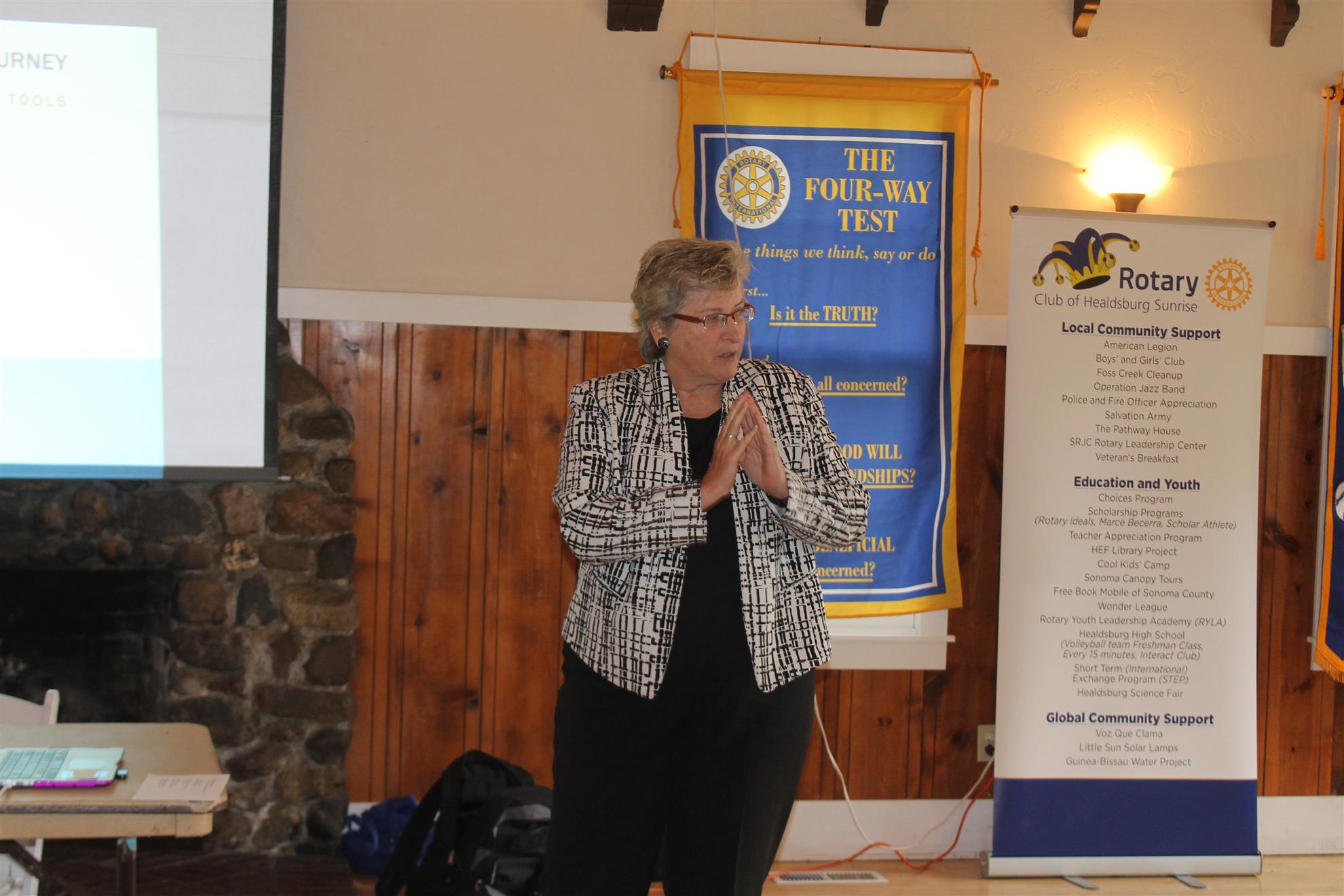Pat Callahan, Fundraising and Major Gift Development
Pat Callahan, California Council on Science and Technology, Dir. of Philanthropy

Pat Callahan, the Director of philanthropy at the California Council on Science and Technology gave a presentation on fundraising and procuring major gifts. She has worked as Dir. of Fundraising for several national organizations including the American Diabetes Association, Canine Companions, Healthcare Foundation of Northern Sonoma County and the American Cancer Society.
To have a successful program, she encourages all participants to put some FUN into FUNd raising. She used as an example a self-made promotional program for our Duck Dash. She used it as an example of how you could work the various components of your funding base not just for the event, but for the entire gamut of programs that Rotary Sunrise believes in, as well as for the principles of Rotary International.
Key to any fundraising effort is motivating the donor to participate. Their willingness to give is part of their journey and part of what gives meaning to their lives. It is imperative that members who are seeking to sell tickets, solicit donations and obtain sponsorships, be totally conversant in the services that this money will buy. It is likewise imperative that you encourage understanding of these goals of the organization, as well as the potential donor’s commitment to them, in order to solicit interest and willingness to contribute.
We are already doing many of the things that she suggested for our Duck Dash. We have posters and flyers, we have a physical presence of ticket sales at major shopping centers with advertising for the event, we have a "workforce" of people who are selling tickets to associates, family members and other professional or personal contacts. In our contacts, we need to create not only awareness of the event, but also awareness of what the event does in terms of promoting Rotary’s ability to provide our valued services.
She divides fundraising in 2 concepts:.First there is the transactional aspect where we are seeking specific funds for a specific purpose. These are usually one time interactions for limited amounts of money based on the participant’s willingness to pay.
Going beyond this is the relationship process in which club members expose potential donors to a broader aspect of the goals that we are pursuing and explore how the potential donor might want to make a difference in his or her community, hoping for a fit of our goals with their objectives for their philanthropy. This type of gifting is usually something that can be counted upon to be done annually and the donor is usually contacted by letter, phone or in person. Usually they are short interactions. The money provided usually comes from current income based on the donor's ability to contribute at that moment in time. The willingness to contribute is based on the synchronization of the donor's objectives with the goals of the organization Rotary and Rotary Sunrise.
Major gifts are defined as gifts in the $5,000 and upward range and usually require a different approach. These are sometimes considered "stretch gifts in that you are asking the person to give more than they may able to give, but are willing to take somewhat less. Prospects are asked in person and discussions regarding the gift usually take place over an extended time frame. During this period of development, the donor and the representative or representatives of the organization are in discussion about the goals and objectives of the organization and how those mesh with those of the the prospective donor. All the organization representatives that are working on a major gift campaign need to be in close contact with each other and working on a definite schedule of interactions. At times, major gifts can be restricted, such as to a scholarship fund, or to a major program that will be continued for many years. Usually at least three or four prospects need to be developed to get one major gift, although sometimes the people who do not give a large major gift, are willing to give a somewhat lesser gift.
People working in fundraising need to be good listeners, and need to be comfortable with leaving “space in in the air” during their conversations so that prospective donors have time to think. You need to care about what the prospective donor says about your organization and see if that truly fits with the organizations objective. In dealing with them in searching for this match, you need to ask questions that are not simple yes or no questions. You need to truly listen to their answers. Good listeners like the people they are talking to and are gracious to them. You need to acknowledge that the donors have probably contributed to many other organizations for which they feel a sense of commitment and you are hopeful in talking with them that they will become committed to our organization.